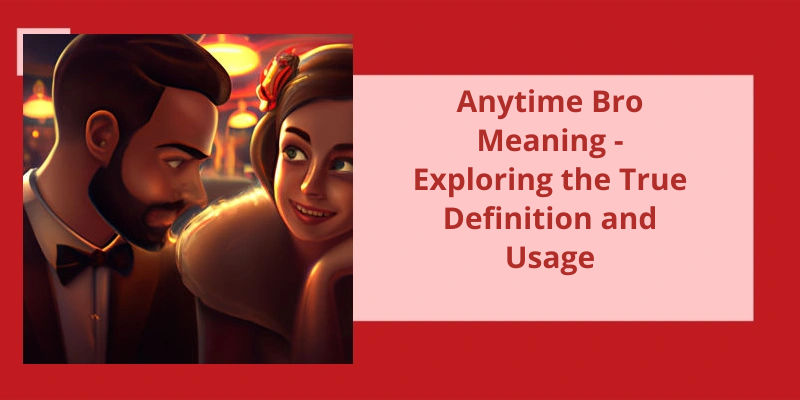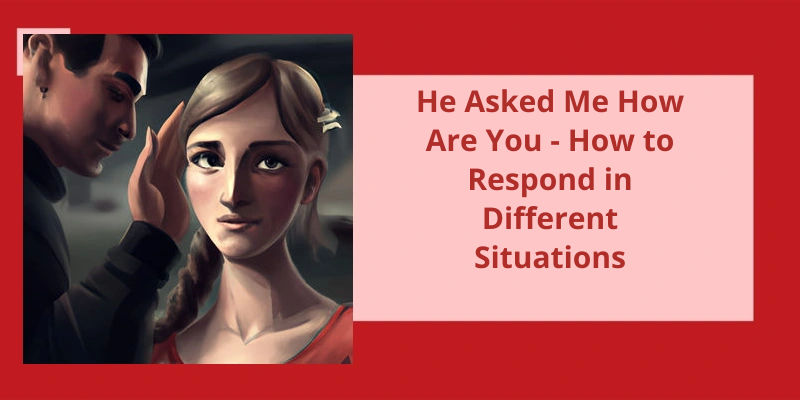The human language is full of expressions and idioms that convey a wide range of meanings and emotions. One such expression is "anytime, bro," which has gained popularity in recent years. While it may seem like a simple phrase, it’s usage and interpretation are multifaceted. At it’s core, "anytime, bro" is a response that conveys readiness and willingness to help or assist someone. However, it’s informal and colloquial nature also gives it a laid-back and friendly tone that can be used in a range of social situations. Additionally, the phrase can also be used as a casual way to acknowledge gratitude, much like the more traditional "you're welcome." Overall, any time bro is a versatile expression and it’s meaning and context can vary based on the speaker, situation, and tone of the conversation.
Can I Start a Sentence With Anytime?
Starting a sentence with anytime is perfectly acceptable English. In fact, it’s common and frequently used in conversation. Using anytime at the beginning of a sentence can add emphasis or urgency to the statement. For example, “Anytime you need my help, just let me know” highlights the speaker’s eagerness to assist.
Additionally, starting a sentence with anytime can also indicate a shift in topic or introduce a new idea. For instance, “Anytime I try to cook, I end up burning the food” signals a change in the conversation from a previous topic to the speaker’s personal experience.
In formal writing, it’s advisable to use a more formal phrase such as “whenever” or “on any occasion” instead.
In terms of word order, anytime can be placed at the beginning, middle, or end of a sentence. It’s most often used at the beginning or end, but can occasionally follow a verb. For example, “I can meet you anytime tomorrow” uses anytime as an adverb modifying the verb “meet.”
However, in formal writing, it’s best to use a more formal phrase instead.
Examples of When It Is Not Appropriate to Start a Sentence With Anytime
Starting a sentence with “anytime” isn’t appropriate when it’s meant to be used as a conjunction or a subordinating conjunction. It’s also not appropriate when it’s unclear what’s being referred to as “anytime”.
Now that we’ve cleared up the definition of “anytime,” let’s explore a common misconception: does it actually mean “you’re welcome”? Many people use “anytime” as a response to “thank you,” but is this usage correct? Let’s find out.
Does Anytime Mean You’re Welcome?
Anytime is often incorrectly used as a response to “Thank you,” as though it means “Youre welcome.”. While it’s true that anytime can be used to indicate availability or willingness to help, it doesn’t convey gratitude for an expression of appreciation. Instead, the phrase “any time” would be appropriate in this context.
The confusion between anytime and any time likely arises from their similar spellings and pronunciations. However, they serve different grammatical functions and convey distinct meanings. Anytime is an adverb that modifies verbs or adjectives, while any time is a noun phrase that refers to a specific point in time.
It’s important to use the correct phrase in order to avoid misunderstandings. Instead, saying “Youre welcome” or “My pleasure” would be more appropriate and show that you value the persons gratitude.
In some cases, anytime may be used in a sarcastic or flippant manner, as though to suggest that the speaker isn’t actually available or willing to help. This usage isn’t considered polite or respectful, and should be avoided in most situations.
Ultimately, the meaning of a phrase depends on it’s context and the intention behind it. Understanding the differences between these two phrases can help avoid miscommunication and maintain positive interpersonal relationships.
Common Phrases for Expressing Gratitude and Their Appropriate Responses
This article discusses common phrases used to express gratitude and their appropriate responses. It aims to provide guidance and examples on how to show appreciation and acknowledge a gesture of kindness.
Now that we’ve established the difference between any time and anytime, it’s important to understand how to properly use each form in different contexts. While they may sound similar, the slight variance in spelling can completely change the meaning of a sentence. Let’s take a closer look at how these two phrases can be utilized in everyday language.
What’s the Difference Between Any Time and Anytime?
Both “any time” and “anytime” have essentially the same meaning, but they’re used in different contexts. For example, if someone asks, “Can you help me with this project anytime this week?” it implies that there’s no rush and that the task could be completed at any point in the week.
It’s important to remember that “anytime” is generally considered informal, and may not be the best choice when writing in a professional context. If in doubt, it’s always a good idea to choose “any time” instead. For example, we say “after any amount of time” and not “after anytime”.
Another way to remember the difference between “anytime” and “any time” is to think about the parts of speech involved. Any time is a noun phrase, which means it functions like a typical noun and can be used as the object of a sentence or as part of a larger phrase. In contrast, anytime is an adverb, which means it modifies a verb or another adverb. As such, it can be used to describe when or how often an action is taking place.
Using the two interchangeable is acceptable, as they basically carry the same meaning. However, it’s not a good habit to form since there’s a difference between the two.
Both phrases are interchangeable in speech but it’s important to note the difference and use the proper form in writing. Remember that the choice between the two depends on the context, and the level of formality. Ultimately, the difference is subtle, and it’s safe to say that using either one won’t cause any confusion in conversation.
Language is a fascinating thing. It’s always evolving, and new words and phrases pop up all the time. Some make their way into dictionaries, while others remain slang or informal language. In this article, we’ll explore the difference between two phrases that are commonly used: anytime and any day. While one has made it’s way into dictionaries, the other is still up for debate. Let’s dive in and see what sets them apart.
What Is the Difference Between Anytime and Any Day?
However, in terms of formal writing, anytime is the preferred adverb to mean at any time, while anyday isn’t used in this context. Anyday is more commonly used in idiomatic expressions, such as “better anyday than yesterday,” which means that something is better today than it was yesterday.
Furthermore, anytime is often used to describe the occurrence of an event, such as “the train arrives anytime between 2 and 4 pm.”. It’s often used to describe a day that’s of no particular importance or significance. For example, “we can meet anyday next week” suggests that the day of the meeting isn’t significant and is left to the convenience of both parties.
Ultimately, the difference between these two phrases lies in their formal and informal use, grammatical structure, and the context in which they’re used. As such, it’s a matter of personal preference and understanding their appropriate usage for effective communication.
The Etymology and Linguistic Origins of Anytime and Anyday, Including Any Related Words or Phrases in Other Languages.
This article discusses the origins of the words “anytime” and “anyday,” as well as related terms from other languages.
When someone says “yeah anytime,” it can be interpreted as a polite invitation to ask for their help or presence in the future. It conveys a sense of hospitality and willingness to assist without any hint of insincerity. In this article, we will explore in greater depth the different nuances and contexts behind this common phrase.
What Does It Mean When Someone Says Yeah Anytime?
When someone says “yeah, anytime,” they’re essentially saying that they’re at the other persons service and are willing to help anytime they need it. The phrase signifies that the person is approachable and that they’re happy to assist whenever the need arises. It also conveys a sense of warmth and generosity, which can be reassuring to the person hearing it.
Sometimes, people might say “yeah, anytime” in response to a suggestion or an invitation. In such cases, the phrase means that the person is open to the idea and would be happy to participate if the opportunity arises. It’s a way of being supportive and showing enthusiasm for the other persons plans.
It isn’t uncommon for people to use “yeah, anytime” as a way of expressing gratitude or appreciation. For example, if someone helps them with something or goes out of their way to make their day better, they might say “yeah, anytime” as a way of saying thank you. This way of expressing gratitude isn’t only polite but also shows that the person truly values the help received.
Conclusion
It's a relaxed and casual way of saying "you're welcome" that's especially common among younger generations. While the origin of the phrase may be difficult to pinpoint, it’s widespread usage illustrates the evolving nature of language and how new expressions and meanings can emerge over time. As language continues to evolve, it's clear that old sayings will continue to take on new meanings and new sayings will emerge to express our feelings and thoughts.






